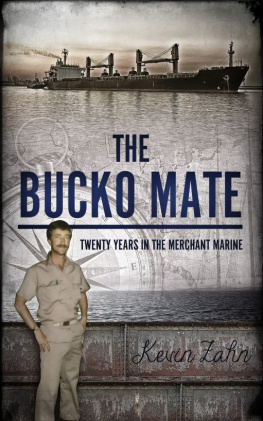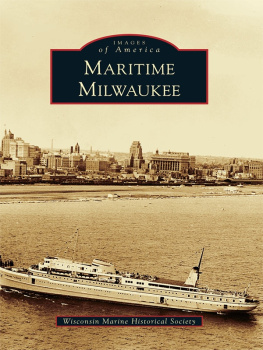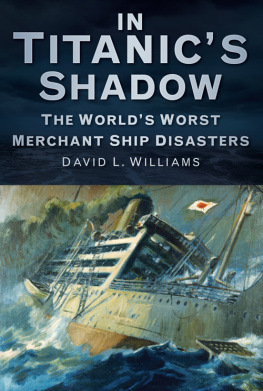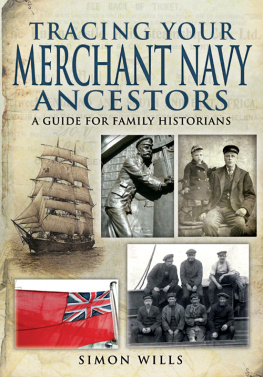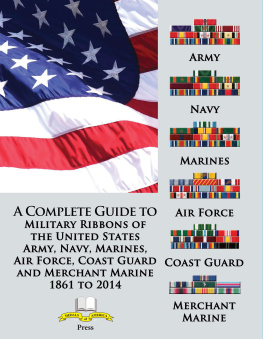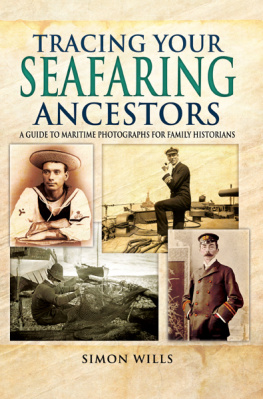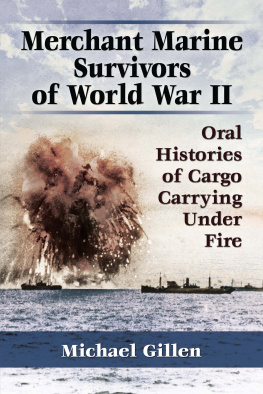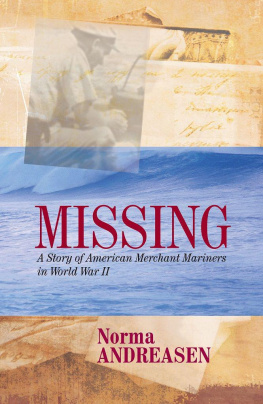The Bucko Mate: Twenty Years in the MerchantMarine
By
Kevin Zahn
* * * * *
Published at Smashwords and Amazon
Copyright 2012 Kevin Zahn
* * * * *
Smashwords/Amazon Edition, License Notes
Thank you for downloading this ebook.Although the first three chapters are free, the entire work remainsthe copyrighted property of the author, and may not be reproduced,copied and distributed for commercial or non-commercial purposes.If you enjoyed this book, please encourage your friends to downloadtheir own copy at Smashwords, Amazon, or Barnesandnoble. Thank youfor your support!
* * * * *
Table of Contents
Chapter 1: Memory Lane
Chapter 2: Easy Money
Chapter 3: A Night in Beirut
Chapter 4: Under the Marks
Chapter 5: Small Port Paradise
Chapter 6: Tankeritis
Chapter 7: The White Elephant
Chapter 8: Going Oriental
Chapter 9: Guns in the Streets
Chapter 10: Captain Charlie
Chapter 11: Any Other -ism?
Chapter 12: We Are Not in Galveston!
Chapter 13: I Thought You Were in Paris?
Chapter 14: The Banana Girls
Chapter 15: Brazilian Rerun
Chapter 16: Hafvilla
Chapter 17: Aussies, Kiwis, Limeys, andYanks
Chapter 18: The Party
Chapter 19: You the Man Now?
Chapter 20: Dont Call Me Ishmael
Chapter 21: Ming Line
Chapter 22: The Deep Six
Chapter 23: Time for Go
* * * * *
Dedication
To those who have gone down
with their ships, and those
who will.
* * * * *
Any fool can carry on in a storm; it is thewise man who knows when to
shorten sail in time.-- Joseph Conrad
There is a way of life that is almost gone.This book is an attempt by one who lived a small part of it to getsome of it down in writing before it disappears. The sea has beenmans greatest challenge. It holds our fascination even now, inthis era of space exploration. Men have gone up against the sea,now women as well. Why? What drives a person to set out acrossthousands of miles of ocean? Adventure? Excitement? The challenge?Escapism from the rest of the world? Probably all of these thingsand more, but elements that have driven people to sail have beenchanging over the last twenty years and will never be the sameagain.
This is a personal look at going to sea,through the eyes of a merchant marine officer, or a mate. Onequestion is, What the hell is the merchant marine? Everyone knowsthat if you join the navy, you are a sailor, and you are a memberof the Armed Forces. However, many other sailors are in themerchant marine. They are not usually part of the Armed Forces,although they can be in wartime and many members of the merchantmarine are members of the Naval Reserve. Simply put, if you are inthe merchant marine you are a civilian sailor.
The proper term for a merchant sailor isseaman, although on the ships, seafaring men use the termsailor, usually for members of the crew. You dont have a ranklike in the navy; your job determines that. You are a mate, anengineer, a bosun, AB, oiler, or a cook. No one salutes. You wearwork clothes, and only the mates wear required khakis. In the olddays, the deck officers, or mates, wore shoulder boards withstripes, and frequently wore ties to dinner. You wore one stripe asa third mate, two for second mate, three for chief mate, and fourfor the captain. There is no dress code for the crew, and no onecan tell you to get a haircut. You are a civilian.
The major concern in merchant marineoperations is that you sail a ship for a private steamship company(although some are government owned) and the goal, like any otherbusiness, is to make money for the owners. You sail here and thereat their orders. You are in business -- the business oftransporting cargo, whether break bulk (general), liquid, bulk,natural gas, military, or whatever needs to be taken somewhere inthe world, for a price.
Owners register merchant ships in a homecountry, and its name is painted on the stern, and governed bytheir rules. In foreign ports, you abide by other, local rules, andwoe to those who forget this. You need a document -- papers for thecrew, or a license for the officers, to do this. There aredifferent ways to get a license to be an officer on a merchantship. In the United States, you can become an officer by attendingan academy for that purpose, a four year course of study. You canalso sail in the crew for several years, and then take the samelicense exam that the students do. In the U.S., the Coast Guardissues the license if you are qualified to take the test and youpass it. License exams take a full week. Then, like anybody else inthe world of work, you go look for a job. You can go union ornon-union. Some countries will recognize the license of anothercountry, and you can work for shipping outfits there, if you canlive on the wages.
The crew of a merchant ship consists of threedepartments: deck, engine, and steward. The captain, who is theboss of all, heads the deck department. Below him are the mates --chief mate, second mate, and one or two third mates. The chief mateis in charge of ship maintenance, cargo loading and unloading,stability, and personnel matters with the crew. The 2nd mate and3rd mates stand watches, navigate the ship, prevent collisions andgroundings, plus help with the cargo, crew, and paperwork. One ofthe mates is the medical officer. The captain does what the hell hewants to do.
The rest of the deck department is in thecrew, and their boss in the bosun. He is like a foreman for all thework done on deck. There are ABs, or Able-Bodied Seamen, and OSs,or Ordinary Seaman. An AB steers the ship in addition to his deckwork, an Ordinary doesnt. They all clean, paint, haul lines, runthe windlasses, drop the anchor, and whatever else superiors tellthem to do on deck.
The chief engineer leads the enginedepartment. Like the chief mate, he usually doesnt stand a watch,and is the head of his department, in control of keeping thelights burning and the screw turning, as well as maintenance,repairs, and fuel oil. His right-hand man is the 1st AssistantEngineer, called The 1st. He is the foreman of the enginedepartment, and is usually a whiz at makeshift, or jury-riggedrepairs. The 2nd and 3rd engineers stand watches down in the engineroom, four hours on and eight off, 24 hours a day, every day, likethe mates. In modern times, this has changed; a modern, automatedship has no watch-standing engineers. The engineers quit at 1700hours (5:00 p.m.) and lock the engine room down for the night.Automatic alarms ring in the engineers rooms if something iswrong.
There are also crewmen who work in the engineroom. In past times, they were oilers or wipers, but now, withcombined duties, they have titles like DeMac, for Deck/EngineMechanic. Life is changing for them, too. They might have to knowmore about computers than how to light off a boiler.
The boss of the stewards department is thechief steward, known as The Steward. He supervises the cooks andutility men who do all of the food preparation, take care of thelinen, and attend to passengers if they carry them. In the heydayof the merchant marine, this department included waiters who servedall three meals to everybody on the ship. Today, on the automatedships there are no waiters. Cooks serve meals cafeteria style, andeven the captain goes down the line with his tray. It would havebeen unthinkable twenty years ago.
If you consider that the merchant marineincludes any commercial, non-military vessel, then you might addthings like fishing boats, research vessels, cable-laying ships,salvage boats, treasure hunters, and tugboats, to the types ofmerchant marine craft. Besides the merchant marine and the navy,you can also go to sea, for a ways at least, in the Coast Guard.Navy subs are full of sailors, of course, but their experience isso different from the surface vessel guys, it seems a separatecategory. There are also thousands of people who go out in pleasurecraft, power and sail, but merchant sailors consider this a vastlydifferent type of sailing. They have respect for the serioussailboat guys who cross the ocean in small boats, even though manyof them are crazy. If you go back in time, you might add crews oflightships (almost gone now) and lifeboat rescue crews, guys whorowed out to wrecks in storms, to the list. Passenger ships arecertainly part of a nations merchant marine (not much for theU.S.), but that type of work is foreign to the rest of the seamenwho work the freighters and tankers. A guy working his butt off onan old freighter would consider a passenger ship a vacation.

